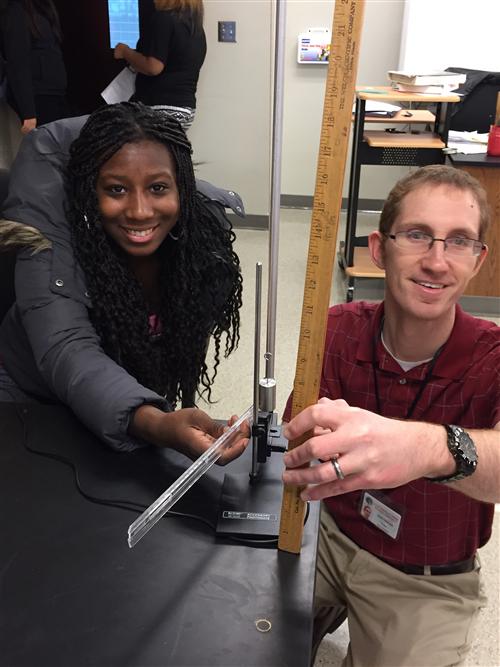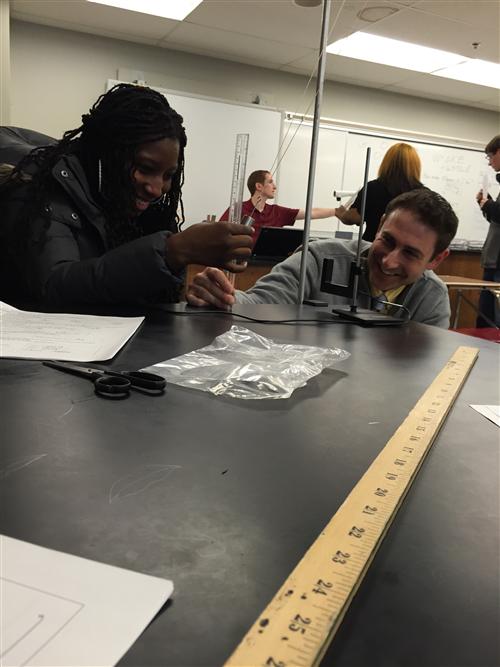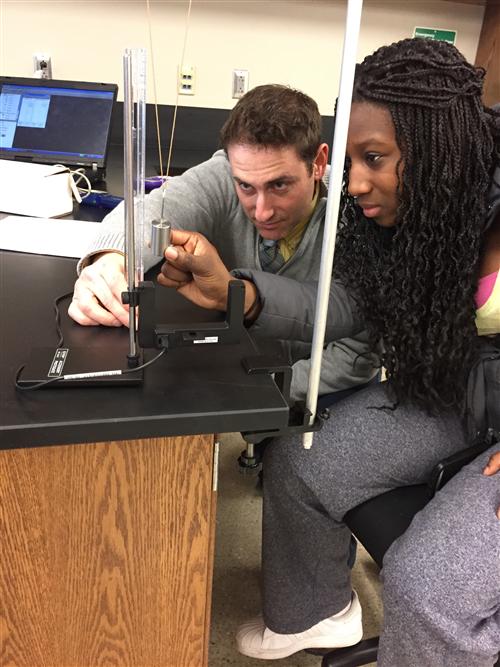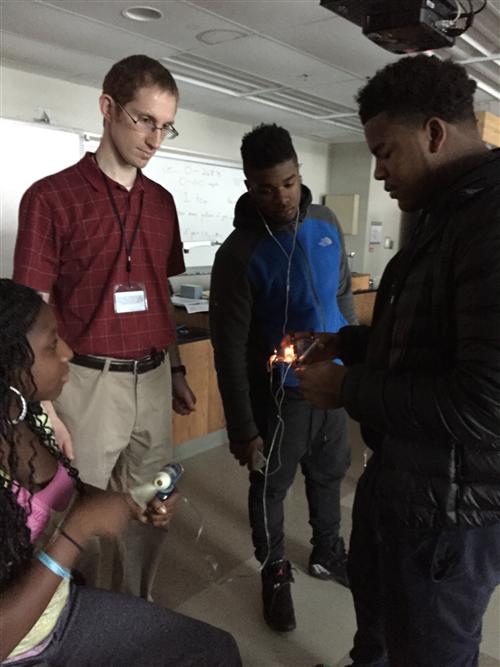- Coatesville Area Senior High School
- Science Department
Science Department




-
The science department at Coatesville Area High School recognizes the need to help students become informed citizens who understand scientific issues that impact our society and the global environment. We also believe that our students need to acquire scientific reasoning and thinking skills in order to become life-long learners able to apply reasoning skills to solving problems. We believe in the use of technology and hands on activities to accomplish these goals.
Science Department Information
The science department offers a variety of courses in the areas of Earth and Space Science, Biology, Chemistry, Forensic Science, and Physics. Advanced courses are available in Anatomy and Physiology, AP Biology, AP Chemistry and AP Physics. Our state of the art lab facilities and equipment allow the science department to offer our students a special learning experience through lab activities and technology. See course listings below.
-
Science Education Course Selections
NOTE: Student placement in Science courses will be based upon the high school leveling rubric.
9440 AP BIOLOGY 1.5 Credits Grades 10-12
(prerequisites: at least 85% in Honors Biology and teacher recommendation)
This courses emphasizes the biological concepts in three overarching topics: molecules and cells, heredity and evolution, and organisms and populations. AP Biology provides students with an opportunity to develop a conceptual framework for modern biology and stresses an understanding of science as a process rather than an accumulation of a set of facts.9443 HONORS HUMAN ANATOMY & PHYSIOLOGY 1.0 Credit Grades 11-12
(prerequisites: Honors or Academic Biology and Honors or Academic Precalculus)
Human Anatomy & Physiology is a course presented in a systematic approach for the college- bound student. It is especially designed for the bioscience or health oriented career fields. The course content includes: principles and functions of the major organ systems as advances are made in biotechnology.9450 AP CHEMISTRY 1.5 Credits Grades 11-12
(prerequisites: at least 85% in both Honors Algebra II and Honors Chemistry)
AP Chemistry is a detailed study of the states and structure of matter, reactions, and descriptive chemistry. A strong emphasis is placed on critical thinking, detailed problem solving, writing, and laboratory work. Students are required to keep a lab notebook and provide their own scientific calculator.9452 HONORS CHEMISTRY 1.0 Credits Grades 10-12
9454 ACADEMIC CHEMISTRY 1.0 Credit Grades 11-12
Chemistry is a lab science class for college bound students. This course uses an inquiry approach with emphases on problem solving and lab investigations. Major topics include: the composition, structure, and changes of matter, the periodic table, and energy. Scientific calculators are required for this course.9447 PHYSICAL SCIENCE 1.0 Credit Grades 11-12
This course will focus on studying the physical world. Emphasis will be based on the evolution of knowledge and understanding regarding the physical process in Chemistry, Physics, Astronomy, and Earth Sciences. Students should expect some algebra-based reasoning and manipulations to explain the natural phenomena featured in this course. This course is for students whose math skills need more time to develop prior to taking chemistry and physics. Students may not enroll in this course if concurrently enrolled in or successfully completed Physics or Chemistry courses.9470 AP PHYSICS 1.5 Credits Grades 11-12
(prerequisite: at least 85% in previous Honors level science course and Precalculus or teacher recommendation)
This course is an intense, college level, Calculus-based course designed to prepare the student to take the AP Physics exam. This is a lab-oriented course that places its emphasis on problem solving. Students will be required to provide their own scientific calculator. Any student who chooses this course should also plan to take the AP exam in May.9476 HONORS PHYSICS 1.0 Credit Grades 11-12
Honors Physics is an Algebra and Trigonometry based course. This course is a mathematical study of everyday occurrences. Students will use and apply equations to understand and predict the behaviors and interaction of objects. Major topic areas will include Forces and Motion, Momentum and Energy, Waves and Electricity. It is a lab-based course that will give the interested student a better understanding of the world around them. Students should have strong math foundations and are required to provide their own scientific calculator.
9476 ACADEMIC PHYSICS 1.0 Credit Grades 11-12
Academic Physics is an Algebra-based course. Physics is the study of how the world works around them. Topics covered include the study of motion, forces, energy, and momentum as well as waves, light, and electricity. During activities in this class, students will learn about flying balls, spinning skaters, musical instruments, and household wiring. It is a lab-based course that will give the interested student a better understanding of the world around them.9434 ACADEMIC FORENSIC SCIENCE 1.0 Credit Grades 11-12
This laboratory course will describe how science is used in the criminal justice system and apply knowledge of criminal law, mathematics, and the sciences to the solving of crimes. Sample topics include fingerprints, hair and fiber, toxicology, trace evidence, forensic serology, and forensic entomology. Students are expected to maintain an organized portfolio of forensic laboratory investigations and research projects.9438 FORENSIC SCIENCE 1.0 Credit Grade 12
This laboratory course will describe how science is used in the criminal justice system and apply knowledge of criminal law, mathematics, and the sciences to the solving of crimes. Sample topics include fingerprints, hair and fiber, toxicology, trace evidence, forensic serology, and forensic entomology. Students are expected to maintain an organized portfolio of forensic laboratory investigations and research projects.9407 ALS SCIENCE RESEARCH 1.5 Credist Grade 11-12
Campus students will work with their teacher to partner with Universiry of Pittsburgh's Live Like Lou ALS Research Team to help work towards the cure for ALS. This opportunity will involve a laboratory driven curriculum and the chance to be a part of cutting-edge scientific research. (AP weighted course). Course to be offered alternate years.9456 INTRO TO FORENSIC SCIENCE (DC) (H) 1.0 Credit Grade 12
This course is a laboratory course that applies knowledge of criminal law, mathematics, and the sciences of solving crimes. Students are expected to maintain an organized portfolio of forensic laboratory investigations and author two research projects, including one involving a local (Philadelphia area) crime case.9420 AP ENVIRONMENTAL SCIENCE 1.5 Credits Grade 10-12
This course will provide students with the scientific concepts and principles to understand the relationships between the natural and human made world, to identify and analyze environmental problems, to understand and analyze environmental problems, to understand and analyze risks associated with these problems, and to examine and develop solutions to these problems. Topics will include earth systems and resources, the living world, population, land and water use, energy resources and consumption, pollution, and global environmental issues. A summer assignment is required.PRINCIPLES OF BIOMEDICAL SCIENCE 1.0 Credit Grade 10-12
In this course, students explore concepts of biology and medicine as they take on the roles of different medical professionals to solve real-world problems. Over the course of the year, students are challenged in various scenarios including investigating a crime scene to solve a mystery, diagnosing and proposing treatment to patients in a family medical practice, to tracking down and containing a medical outbreak at a local hospital, stabilizing a patient during an emergency, and collaborating with others to design solutions to local and global medical problems. Principles of Biomedical Science (PBS) is a full-year high school course in the PLTW Biomedical Science Program. This course serves to provide foundational knowledge and skills in fields such as biology, anatomy & physiology, genetics, microbiology, and epidemiology as well as engage students in how this content can be applied to real-world situations, cases, and problems. Through both individual and collaborative team activities, projects, and problems, students will tackle real-world challenges faced by biomedical professionals in the field. They will work with the same tools and equipment used in hospitals and labs as they engage in relevant hands-on work. Students will develop skills in technical documentation to represent and communicate experimental findings and solutions to problems. In addition, students will explore how connections to other disciplines such as computer science and engineering shape the future of medicine and practice collaboration techniques that will help them connect with professionals across any field.
-
10/11/12 Building
Mr. Damiano Email damianod@casdschools.org
Mr. Demos Email demosj@casdschools.org
Mr. Gellner Email gellnerj@casdschools.org
Mr. Hofmann Email hofmanne@casdschools.org
Dr. Krasowski Email krasowskic@casdschools.org
Mr. Menaker Email menakerj@casdschools.org
Mr. Mendenhall Email mendenhallw@casdschools.org
Mr. Pilz Email pilzd@casdschools.org
Ms. Strube Email strubea@casdschools.org
Mr. Vint Email vintc@casdschools.org
Mrs. Warren-Ward Email warrenwardo@casdschools.org

